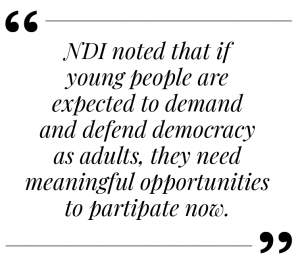
Last Saturday, there was a major traffic jam in the main street of our barangay because of simultaneous motorcades of candidates from different colors. That is how I can distinguish one team from the other by the color coding of their balloons.
Campaigning in the barangay and SK election is colorful, fierce, and loud. But for people not involved in their barangay affairs, they do not pay close attention to the candidates and the issues. Some do not even bother to vote because they see it as “less important” than the other local and national elections.
Until they need to get a barangay clearance or a barangay resolution to support their government paperwork or resolve a dispute involving a neighbor or ask for financial assistance (ayuda) or complain about garbage collection and such. Then the barangay council matters.
So, of course, the barangay elections matter. Local governance starts here. How our barangay is governed impacts our daily lives more than how our national leaders run our country. Because the enforcement of local and national laws and implementation of government programs are done in the barangay level.
We felt the significance of our barangay chair and barangay council the most during the height of the COVID-19 pandemic lockdowns. Our survival as a community was literally in their hands.
If barangay elections are not seen as important enough by some people, the SK elections hardly get any attention. Because they involve the youth and, unfortunately, young people in this country are not really taken seriously.
The Philippines today has the largest generation of young people in its history. Our country counts as youth those who are in ages 15 to 30 years old. They are 28 percent of the total Philippine population or around 30 million. In terms of registered voters, they are close to 20 million or 30 percent of the total voters. So the youth is not just a sector, it is the majority in the Philippines.
In Davao City, 3 out of 10 individuals are young people. Young Davaoeños comprise 30 percent of the total population of 1.77 million at 530,766 as of the 2020 census. This makes Davao a young city and a city of young people.
That makes the SK elections the most important election in Davao City and in the entire country.
UN Secretary General (1997-2006) Kofi Annan made a very wise observation when he said: “Normally when we need to know something we go to the experts, but we tend to forget that when we want to know about the youth and what they feel and what they want, that we should talk to them.”
If the youth are the majority in Davao and in the Philippines — and if we believe that “majority rules” — shouldn’t more young people be in positions of leadership and power now?
According to the National Democratic Institute (NDI), a non-profit, non-partisan, non-governmental organization that promotes democracy and freedom in countries around the world, today’s young people are experiencing “growing dissatisfaction and distrust in government, including democratic institutions that are failing to deliver.”
NDI noted that if young people are expected to demand and defend democracy as adults, they need meaningful opportunities to participate now.
Yes, now. Not in some distant future where the youth are touted as its hope.
I am tired of hearing politicians refer to the youth as “our future leaders” because it is actually a message that says: “Wait for your turn to govern because we are not ready to retire from this position of power yet.” And our old politicians are living longer than ever. Behold Juan Ponce Enrile as Exhibit A. So when will the youth get their chance to lead?
Maturity, experience, and wisdom are great qualities in a leader but if we are operating under the same old unjust structures and dysfunctional systems, those qualities only serve and perpetuate the status quo.
That is why we have a lot of politicians who are very mature to have served under eight Presidents, very experienced in corruption, and very wise not to get convicted and jailed for abusing power.
Is this the leadership model and concept of power we are training our youth to be good at when it is their turn to govern?
Growing youth disillusionment is fueling a search for alternatives.
“Although perceived to be apathetic and incapable by most adults, youth political participation in many countries is on the rise with young people expressing optimism about their capacity to achieve positive social change and their ability to play a role in how their countries are governed,” NDI reported.
I believe this with all my heart. Young people are at the heart of many of the world’s most successful nonviolent movements. Young activists are creative and open to new ways of doing things and are able to collaborate with diverse groups. Youth are agents of change and creators and bearers of culture. Countless evidence and studies demonstrate that youth participation improves outcomes.
Some of NDI’s recommendations in improving youth participation are: (1) helping young people build power and influence by including youth with diverse identities in all levels of decision-making; (2) supporting organized youth participation across development sectors; (3) fostering intergenerational collaboration to shift attitudes and behaviors that sideline young people; and (4) understanding and embracing new ways of making democracy work to encourage more a active role for youth allies.
We need to dismantle our unjust structures and dysfunctional systems that have not worked for so long now and only marginalized our young people. It is not enough to just elect new leaders. For positive change to happen, the youth — with their creative and innovative ways of solving social problems — must lead now.
